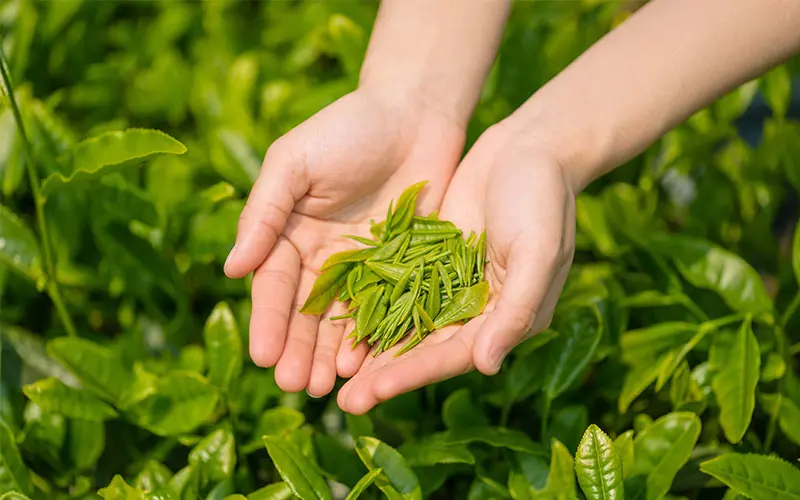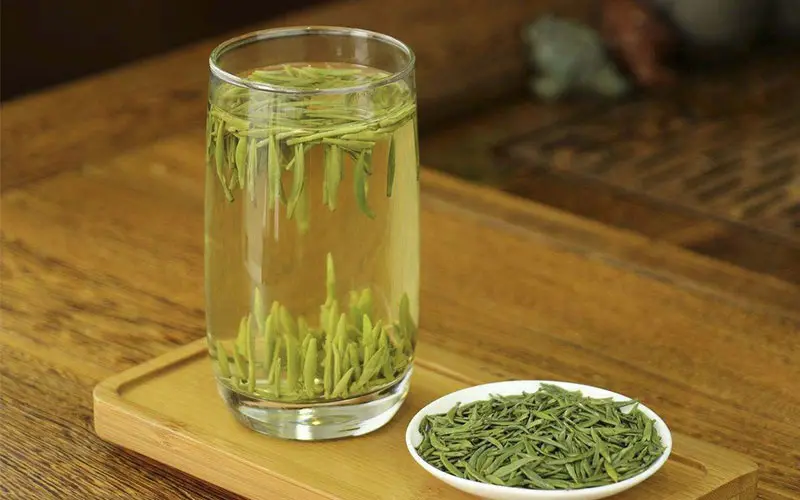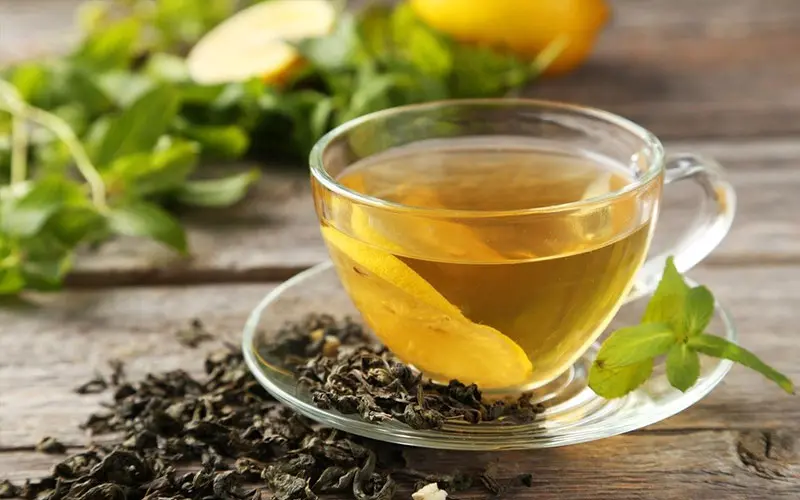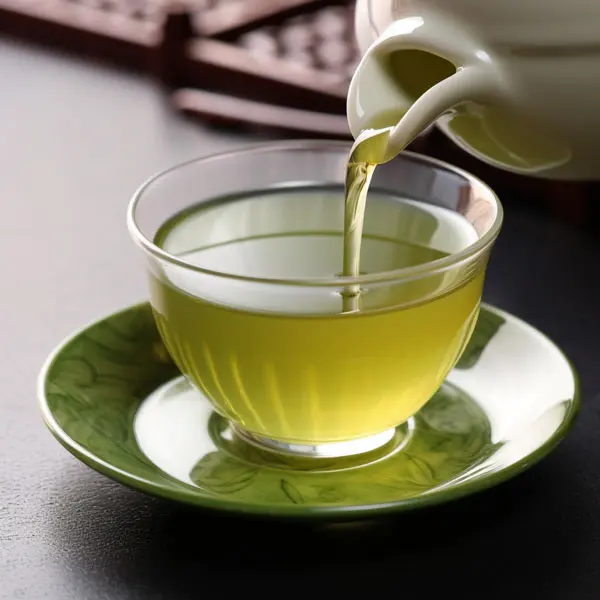Ever wondered why green tea has been the talk of the wellness town for decades? In addition to its good-tasting nature, it has health benefits that have been celebrated for thousands of years. This article will explain the rich nutrients in green tea and the benefits for your health. So, pour yourself a cup, and let’s embark on this enlightening journey.
What Is Green Tea?
Green tea, an ancient beverage originating from China, dates back nearly 5,000 years. Initially prized as a detoxifying medicine, it gradually evolved into a staple health drink for Asians, holding a status akin to rice in daily consumption. People worldwide, especially in its primary producing regions like China, Japan, India, and Sri Lanka, cherish green tea.
Interestingly, the first tea introduced to Europeans was green tea, brought to France by the Dutch in the 17th century. Soon, Europeans recognized the benefits of green tea – feeling invigorated and having an enhanced immunity after consumption. This prompted them to delve deeper into its nutritional value. Let’s explore this further together.

Nutrients of Green Tea
Green tea is indeed rich in nutritional compounds. It’s important to note that the exact composition and concentration of these compounds can vary based on the type of green tea, where it’s grown, how it’s processed, and how it’s brewed. To visualize this more, I’ll use the nutrient content in a cup of green tea (8 ounces) as an example.
- Catechins (including EGCG)
These are a type of natural antioxidant and polyphenol. The most abundant catechin in green tea is epigallocatechin gallate (EGCG), which is believed to be responsible for many of the health benefits linked to green tea. Green tea typically contains between 30 mg to 100 mg of catechins, with EGCG being the most abundant. Some estimates suggest there might be roughly 50 mg to 100 mg of EGCG in a cup.
- Caffeine
Green tea contains a moderate amount of caffeine, less than coffee but sufficient to promote alertness without inducing the “jitters” for most people. It’s thought to work synergistically with other compounds in green tea to enhance fat burning. The caffeine content can range from 20 mg to 60 mg. It’s typically closer to 20-30 mg for a regular brew, but it can be higher if the tea is steeped for a longer time or if more leaves are used.
RELATED:How does the caffeine in black tea compare to green tea?
- Theanine
An amino acid that’s believed to work synergistically with caffeine to improve brain function. Theanine promotes relaxation and can reduce the perception of stress. The content in a cup of tea is roughly 1-8 mg, but this can vary. Theanine is more prevalent in shade-grown teas like matcha or gyokuro.
- Vitamins
Green tea contains vitamins, including B vitamins like B2 (riboflavin) and B1 (thiamine). It also contains folate and Vitamin C, although in smaller quantities. For example, Vitamin B2 might be around 0.05 mg, and Vitamin C might be less than 1 mg.
- Minerals
It offers essential minerals, including manganese, magnesium, and zinc. Again, these are present in trace amounts. For example, an 8-ounce green tea might have around 0.5-1 mg of manganese, which is a significant portion of the daily value.
- Flavonoids
These are a group of polyphenols that have antioxidant properties. They can neutralize harmful free radicals, potentially reducing the risk of certain chronic diseases. Apart from catechins, other flavonoids are present in smaller amounts, perhaps in the range of 10-20 mg.
- Tannins
These are polyphenolic compounds known for their astringency. While they contribute to the taste profile of green tea, they can also interfere with the absorption of certain minerals like iron. The exact amount can vary, but given that tannins contribute to the astringency, teas that taste more astringent might have higher levels.
- Volatile Compounds, Polysaccharides, and Lipids
Responsible for the aroma and flavor of green tea, these include aldehydes, alcohols, esters, and lactones.These are present in trace amounts, contributing to flavor and potential health benefits, but exact quantities can be tough to pinpoint without specific laboratory analysis.

Green Tea Benefits
- Cancer Prevention
Green tea contains a class of antioxidants known as catechins, which are believed to have anti-cancer properties. Epigallocatechin gallate (EGCG), in particular, has been studied for its potential to inhibit the growth of cancer cells and prevent the spread of tumors. Regular consumption of green tea might reduce the risk of certain types of cancer, such as breast, prostate, and liver cancer.
Beyond prevention, green tea might also play a role in reducing the progression of cancer or enhancing the effects of certain chemotherapy agents.
- Guards the Heart ealth
Green tea helps in lowering levels of bad cholesterol and improving the ratio of good cholesterol to bad cholesterol. It improves blood flow and helps in maintaining blood pressure, thus supporting overall cardiovascular health.
- Fends off Type 2 Diabetes
Green tea can improve insulin sensitivity and reduce blood sugar levels. This can be beneficial for people at risk of Type 2 Diabetes or those already diagnosed with the condition.
- Reduces Stroke Risks
Regular consumption of green tea might be associated with a reduced risk of stroke due to its positive effects on blood vessels and cholesterol.
- A Remedy for Genital Warts
Topical application of green tea extracts has been shown to be effective in treating genital warts, primarily due to its antiviral properties.
- An Elixir for the Skin
Green tea’s antioxidants can counteract oxidative stress, which can contribute to aging. This makes it a popular ingredient in skincare products. It can also help in reducing the effects of sun damage.
- Aids in Weight Loss
Green tea can boost metabolism and enhance fat oxidation, making it a popular choice among individuals aiming for weight loss. The caffeine content, although lower than coffee, can also play a role in fat burning.
- Helps Maintain Cholesterol Levels
Green tea can help reduce LDL (bad) cholesterol while increasing HDL (good) cholesterol, promoting overall heart health.
- Reduces Symptoms of Rheumatoid Arthritis
The anti-inflammatory properties of green tea can help alleviate symptoms and inflammation associated with Rheumatoid Arthritis.
- Boosts Alertness and Brain Health
Caffeine and L-theanine found in green tea can improve various aspects of brain function, including mood, alertness, and cognitive performance. Some studies suggest that green tea consumption might also reduce the risk of neurodegenerative diseases like Alzheimer’s.
- Fights Fatigue and Enhances Metabolism
The caffeine content in green tea acts as a stimulant that can help fight fatigue and improve physical performance.
- Prevent Dental Caries
Green tea has natural fluoride and antimicrobial agents. This makes it beneficial for oral health as it can kill bacteria and inhibit viruses, potentially reducing the risk of cavities and improving overall oral hygiene.
While these benefits are promising, it’s always important to consult with healthcare professionals when considering changes to one’s diet or health regimen. Not everyone might experience these benefits, and results can vary based on various factors.

Green Tea Side Effects
Absolutely, just as green tea offers numerous health benefits, it’s important to be aware of its potential side effects when consumed in large quantities or under certain conditions. Here are the expanded points on the side effects of green tea:
- Caffeine Sensitivity
Some people are particularly sensitive to caffeine, which is present in green tea. This can lead to symptoms like insomnia, nervousness, irritability, and rapid heartbeat.
- Stomach Problems
Green tea is acidic and can sometimes irritate the stomach, leading to symptoms like nausea or stomach pain. It’s best consumed after meals rather than on an empty stomach.
- Iron Absorption
The tannins in green tea can bind with iron, potentially reducing its absorption in the body. This could be a concern for individuals with iron-deficiency anemia.
- Bone Health
Excessive consumption of green tea might decrease calcium absorption in the body, possibly affecting bone health.
- Liver Health Concerns
There have been rare cases where green tea extract supplements (not the beverage itself) have been linked to liver damage. It’s essential to be cautious and consult with healthcare providers when considering concentrated green tea supplements.
- Bleeding Disorders
Green tea might increase the risk of bleeding, so those with bleeding disorders or taking anticoagulant medications should be cautious.
- Blood Pressure
While green tea can help lower blood pressure, excessive intake might cause a rise, especially in people who are sensitive to caffeine.
- Diuretic Effect
Due to its caffeine content, green tea can act as a diuretic, leading to increased urine output and potential dehydration if one isn’t hydrating adequately.
- Interaction with Medication
Green tea can interfere with certain medications, including stimulant drugs, medications for heart conditions, and anticoagulant medications. Always consult with a doctor if you’re on medication and want to consume green tea regularly.
- Glaucoma
Caffeine present in green tea can increase the pressure inside the eye, which can be problematic for glaucoma patients.
It’s important to remember that moderate consumption of green tea is generally considered safe for most people. However, one should be aware of their body’s reactions and always consult with healthcare professionals if they’re considering green tea as part of a medical or health regimen.

General Advice on Drinking Green Tea
While green tea offers a range of health benefits to various groups of people, it’s essential to consider individual circumstances and health conditions. Green tea is just a daily health food and should never be used as a substitute for medicine. You would do well to take note of the following 3 points when drinking green tea.
- Quality Matters: Always opt for high-quality tea, as some low-quality variants might be tainted with excessive fluoride or other harmful substances.
- Avoid Overconsumption: While green tea offers numerous health benefits, it’s always best to consume it in moderation. Excessive consumption can lead to caffeine-related side effects.
- Brewing Time: Over-steeping can lead to an overly bitter taste. Steeping for about 2-3 minutes is often recommended for a balanced flavor.
- Pregnant women should drink green tea in moderation. Drinking too much is likely to lead to iron deficiency anemia during pregnancy, which is also detrimental to the growth and development of the fetus.
Finally, one more piece of advice: Always consult with a healthcare professional if in doubt.
FAQ
1. Is green tea better than black tea?
While both come from the same plant, green tea is less processed, retaining more antioxidants. However, preference depends on individual taste and specific health goals.
2. How much green tea should I drink daily?
For most adults, drinking 3-4 cups a day provides the benefits without the side effects.
3. Is green tea suitable for kids?
In moderation and lower concentrations, yes. However, it’s always wise to consult with a pediatrician first.





